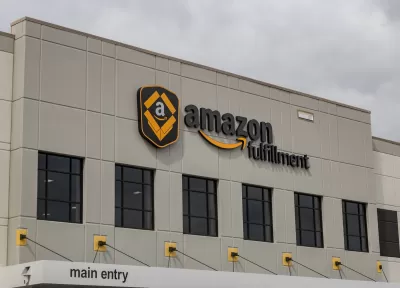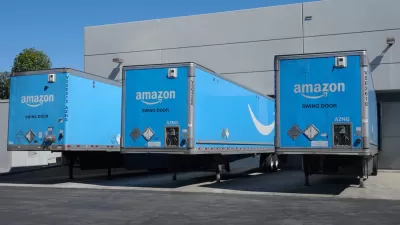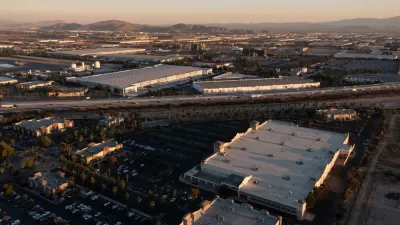As e-commerce giants like Amazon build more and more facilities, advocates say a regional approach is needed to prevent sprawl and look beyond local benefits.

"A current surge in warehouse construction is raising concern among planners and environmentalists that scarce open space is being eaten up by giant warehouses that generate truck traffic on rural roads, increase contaminated stormwater runoff from more paved surfaces, and industrialize the state’s few remaining rural enclaves," reports Jon Hurdle in NJ Spotlight. But the warehouses also bring jobs and taxes, incentives valued by local leaders who object to the prospect of losing control of land use decisions in their jurisdictions. With Amazon as New Jersey's largest employer, advocates say "the trend raises wider issues that should also be addressed by county or statewide authorities" rather than left up to "myriad local governments" narrowly focused on their own "fiscal self-interest."
Tim Evans, director of research for the nonprofit New Jersey Future, argues that "a 'regional perspective' is needed to ensure that increasing demand for the storage of imported goods does not result in the development of land that is better used for farming or recreation, and that the most suitable land for warehousing — such as that near the ports of Newark, Elizabeth and Bayonne — does not get used for another purpose that could easily be done elsewhere."
As a home-rule state, New Jersey largely gives local governments the final say over land use decisions, and Evans admits "any attempt to dilute the power of local government over land-use planning would prompt strong pushback." But decisions made at the local level can affect their surrounding area, as seen in Warren County, where county officials have urged municipalities to present a united front in resisting the construction of new warehouse facilities on greenfield land. To Evans and other advocates of regional planning, a regional approach is necessary to "help the state avoid the worst impacts of the warehouse boom which is underpinned by e-commerce and fueled by the COVID-19 pandemic."
FULL STORY: Warehouse sprawl shows need for regional approach to planning, advocates say

Alabama: Trump Terminates Settlements for Black Communities Harmed By Raw Sewage
Trump deemed the landmark civil rights agreement “illegal DEI and environmental justice policy.”

Study: Maui’s Plan to Convert Vacation Rentals to Long-Term Housing Could Cause Nearly $1 Billion Economic Loss
The plan would reduce visitor accommodation by 25% resulting in 1,900 jobs lost.

Planetizen Federal Action Tracker
A weekly monitor of how Trump’s orders and actions are impacting planners and planning in America.

Waymo Gets Permission to Map SF’s Market Street
If allowed to operate on the traffic-restricted street, Waymo’s autonomous taxis would have a leg up over ride-hailing competitors — and counter the city’s efforts to grow bike and pedestrian on the thoroughfare.

Parklet Symposium Highlights the Success of Shared Spaces
Parklets got a boost during the Covid-19 pandemic, when the concept was translated to outdoor dining programs that offered restaurants a lifeline during the shutdown.

Federal Homelessness Agency Places Entire Staff on Leave
The U.S. Interagency Council on Homelessness is the only federal agency dedicated to preventing and ending homelessness.
Urban Design for Planners 1: Software Tools
This six-course series explores essential urban design concepts using open source software and equips planners with the tools they need to participate fully in the urban design process.
Planning for Universal Design
Learn the tools for implementing Universal Design in planning regulations.
Caltrans
Smith Gee Studio
Institute for Housing and Urban Development Studies (IHS)
City of Grandview
Harvard GSD Executive Education
Toledo-Lucas County Plan Commissions
Salt Lake City
NYU Wagner Graduate School of Public Service





























